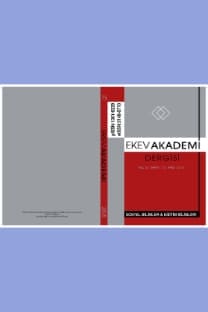İBÂDİ TEFSİR USÛLÜNE GENEL BİR BAKIŞ
İbâdilik hakkında Müslüman ve gayri-Müslim ilim adamlarının çalışmalarının son zamanlarda artmasına rağmen istenilen seviyede olmadığı rahatlıkla söylenebilir. İbâdiliğin mezhep olarak tarihi gelişimini ele alan bir hayli çalışma önceliğini korurken, söz konusu mezhebin İslami ilimler sahasında ortaya koyduğu eserler hâlâ meraklı araştırmacıları beklemektedir. Bu nedenle her geçen gün yeni bir yazmanın gün yüzüne çıkarıldığı İbâdilikle ilgili çalışmaların etraflı bir şekilde ele alınmasına ciddi ihtiyaç vardır. Genel İbâdi-İslam literatürüne bakıldığında ise, İbâdi fıkhı ve kelamı konusundaki eserlerle mukayese edildiğinde en fakir alanın İbâdi tefsir çalışmaları olduğu görülecektir. Belki söz konusu alanda yeterli İbâdi malzemenin olmayışı bu sessizliği tetiklemiş olabilir, fakat bugün İbâdi tefsir algısını ve tasavvurunu ortaya çıkaracak bir literatürün mevcudiyeti de aşikârdır. Bu makalede, İbâdi müfessir ve âlimlerin eserleri çerçevesinde, İbâdi tefsir usûlünün imkânı üzerinde durulacaktır. Araştırdığımız kadarıyla herhangi bir çalışmanın bulunmadığıbu alanda, İbâdi tefsir usûlünün öncelikli maddeleri, diğer tefsir usûlleriyle olan benzerlikleri ve farklılıkları ve İbâdi tefsir usûlünün genel tefsir çalışmalarına hangi açılardan katkıda bulunduğu ele alınacaktır.
Ibadis' Approaches to the Methodology of Qur'anic Exegesis
In recent times, research on the Ibadi tradition by both Muslim and non-Muslim scholars have increased; however, we can still comfortably say that this increase is not at the desired level. While the primary focus of researchers remain in the study of the Ibadi tradition as a school of thought, the important contribution and works of the Ibadi tradition towards various Islamic disciplines, still await curios researchers to discover them. For this reason, there is a serious need for a comprehensive study of the Ibadi works on Islam, especially as with every passing day, there have been new manuscripts being discovered. When we look at Ibadi Islamic literature in general and compare Ibadi jurisprudence and theology, we will realise that the poorest and the most undiscovered areas of study is the area of Ibadi works on exegesis (tafsir). The once nonaccessible and insufficient amount of Ibadi resources and materials may have triggered this lack of study, however, today, the existence of materials related to the concept of Ibadi exegesis and understanding is clearly evident. In this paper, I will focus on the methodology of Ibadi exegesis in the light of commentators of the Qur'an who are of the Ibadi tradition. As far as I know, this paper will be a first in this field of research, and discuss the primary articles of the method of exegesis, the similarities and differences between other methods of exegesis, and the original contributions of the Ibadi method of exegesis.
